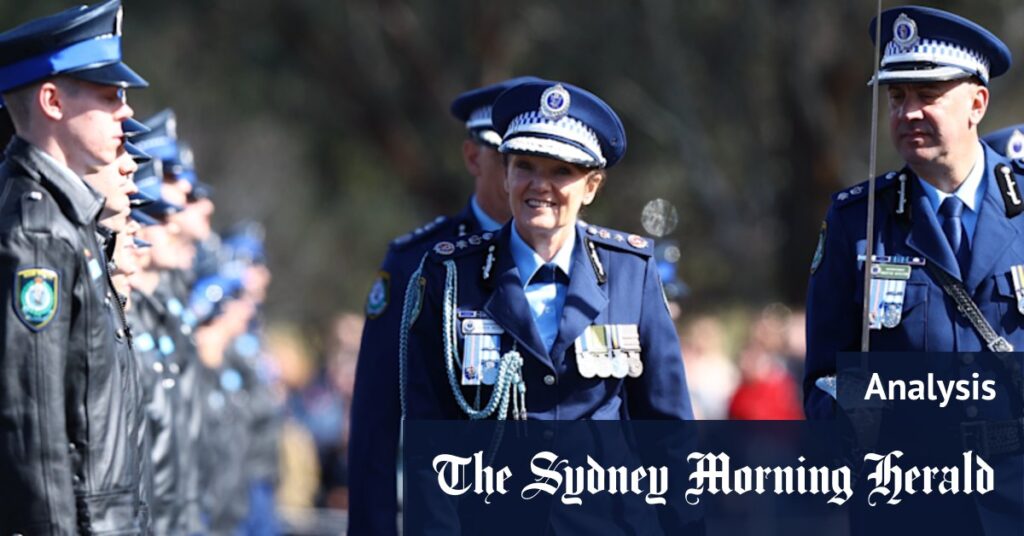One of the criticisms of Webb was that her timidity in front of the cameras left her struggling to provide that reassurance. Yet the revolving roster of commissioners since her departure has highlighted the leadership void, both for the public and for the police themselves.
Rumours abound about when Webb’s replacement will be announced. It may be as soon as Monday, now that she has had her ceremonial farewell. The government may wait until after budget estimates on September 3, so the decision is less likely to be raked over by MPs.
(Anticlockwise from top left) Mal Lanyon, Mick Willing and Dave Hudson are contenders to replace Karen Webb in the top job.Credit: Michael Howard
The favourite is deputy commissioner Mal Lanyon, who is on secondment to the Reconstruction Authority. If he’s the one waiting in the wings, the delay might be a tactful one; there was no love lost between Lanyon and Webb.
The new appointee will inherit a challenging job. History shows it can be a treacherous tightrope to walk – right-wing media on one side, demanding greater toughness; critics of that same toughness on the left, concerned about police abusing their powers; and politicians panicking whenever one of those camps gets loud enough to threaten their electoral prospects.
But the most uncomfortable spot for a NSW Police commissioner can be the police executive offices themselves, which are notorious for leaks and factions and vaulting ambitions.
Webb’s three-year tenure was characterised by constant attacks, particularly about her public performance and her media decisions. She was particularly damaged by her response to two deep crises that shattered public confidence in NSW Police, both involving the deaths of civilians allegedly at the hands of serving police officers.
In both cases, she was criticised for her failure to front the public soon enough, and when she did front the microphones, for the language she used; “Haters like to hate,” she said, quoting Taylor Swift.
She was arguably the most heavily criticised police commissioner since Peter Ryan, whose job involved cleaning up the force after the Wood Royal Commission (before then, criticism of NSW Police was more likely to involve issues of corruption than public speaking prowess).
There are debates over whether the judgments of Webb were fair or not. Some argue she was given a hard time because the famously blokey police culture within the NSW Police Force still can’t embrace femininity, or an approach to the job that doesn’t involve putting oneself front and centre; others believe she simply wasn’t the right leader and didn’t have the right skills.
While rumours intensify that Lanyon will be anointed, there is only one certainty about her replacement; it will be a man.
Every one of the six interviewees for the top job was a bloke. That there were no women even within striking distance of the commissionership is an indication that despite Webb’s tenure, or even because of it, prospects for women in the NSW Police Force have not improved.
Six years ago, women made up 27.6 per cent of police officers in NSW. In 2020, it was 28 per cent, and now it’s 28.2; a marginal increase at best.
A review of the force by former sex discrimination commissioner Elizabeth Broderick in 2019 found more than half of female officers agreed it was difficult for women to achieve the rank of commissioner, mostly due to caring responsibilities, an issue the force has still not fixed. Only 8 per cent of men thought it would be difficult for a bloke to rise to the top.
Turns out they were right. The NSW Police Force will soon be back in its comfort zone, with a man at the helm.
Start the day with a summary of the day’s most important and interesting stories, analysis and insights. Sign up for our Morning Edition newsletter.
Read the full article here


